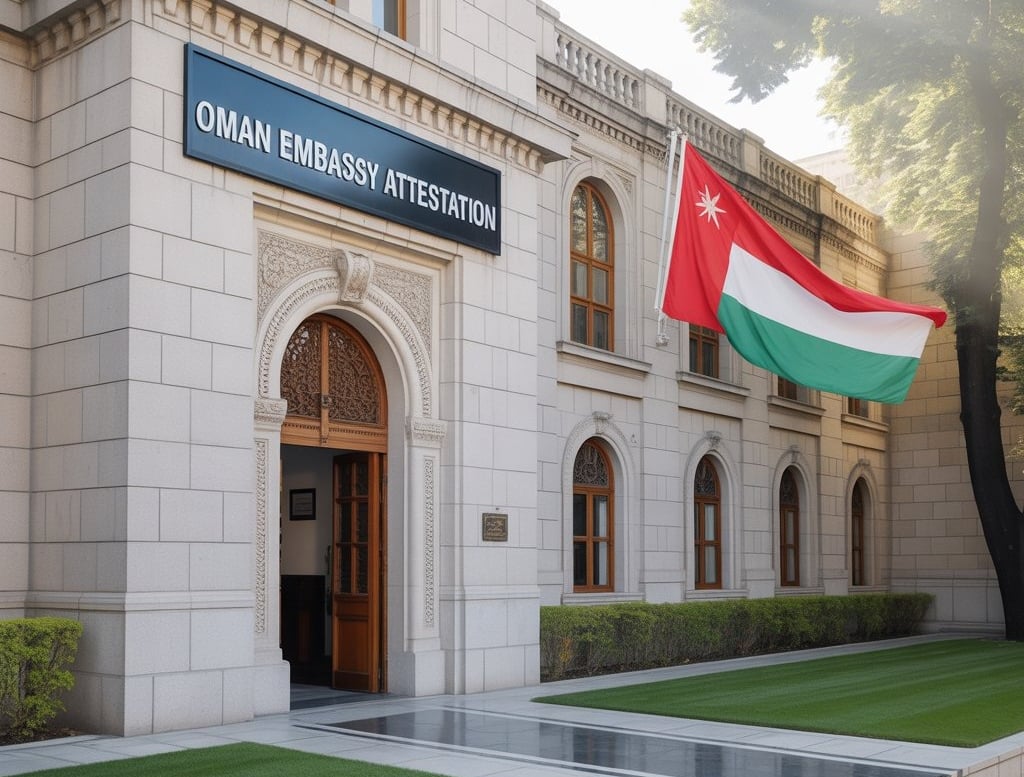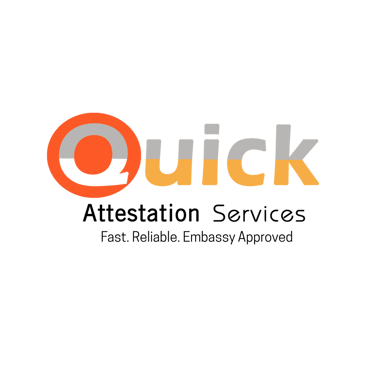Oman Embassy Attestation Services Guide
Discover everything you need to know about Oman embassy attestation services. Learn about document attestation in Oman, the process, requirements, and how to ensure your documents are properly attested for use abroad.
9/15/20257 min read


Introduction to Embassy Attestation Services
Embassy attestation services are a vital part of the international documentation process, allowing individuals to validate their legal documents for use abroad. This procedure involves certifying that a document is genuine and, therefore, acceptable by foreign authorities. The necessity for this type of validation arises especially for expatriates or anyone seeking to utilize various documents, such as educational certificates, marriage licenses, or professional licenses, in a foreign country.
In the context of Oman, embassy attestation services play a crucial role for both citizens and expatriates aiming to navigate the complexities of international documentation requirements. The attestation process typically involves multiple steps, starting from obtaining an initial verification from the relevant authorities in the home country, such as the Ministry of Foreign Affairs or other applicable governmental entities, before proceeding to the Omani Embassy or Consulate. This step-by-step approach ensures that documents will meet the specific legal standards necessary for acceptance in Oman or any other country.
One of the primary reasons individuals require embassy attestation services is to ensure that their documents are legally recognized, particularly in foreign jurisdictions. For expatriates planning to work, study, or reside outside their home country, proper attestation is essential. It streamlines processes such as visa applications, job procurements, and enrollment in educational institutions. Additionally, it instills confidence in governmental and institutional entities regarding the authenticity of submitted documents.
In summary, embassy attestation services serve as a critical bridge between individuals and foreign authorities, facilitating the legal recognition of essential documents. By understanding the importance of this process, expatriates, and those involved in international transactions can better prepare themselves for the requirements associated with document validation.
The Importance of Document Attestation for Oman
Document attestation plays a pivotal role in ensuring the authenticity and legitimacy of various documents in Oman. This process involves the verification of documents such as educational certificates, marriage certificates, and commercial papers, ensuring that they are recognized and accepted by the Omani government. The significance of this attestation cannot be overstated, as it serves as a prerequisite for numerous legal and administrative procedures within the country.
One of the primary reasons for document attestation in Oman is to facilitate the migration process for individuals seeking employment or education in the Sultanate. Educational certificates, for instance, require attestation to prove the qualifications of foreign graduates. This ensures that employers and educational institutions in Oman recognize these credentials, thus aiding in a smooth transition for expatriates. Moreover, any discrepancies in document authenticity could result in delays or rejections, making attestation a critical step for those planning to relocate to Oman.
Similarly, marriage certificates also necessitate attestation, particularly for expatriates marrying Omani nationals. This verification process assures the Omani authorities of the legitimacy of the marriage, which is essential for obtaining residency or family reunification visas. Additionally, the attestation of commercial documents is vital for businesses looking to operate in Oman. This process affirms that the documents submitted for business registration or contracts are credible and adhere to Omani laws.
The Omani government recognizes the significance of document attestation, employing a systematic approach to verify the authenticity of documents presented for attestation purposes. By establishing a robust framework for attestation, the government ensures that all documents are duly vetted, ultimately upholding the legal and administrative standards of the nation. As such, document attestation is not just a procedural necessity, but a fundamental aspect of fostering trust and legality in both personal and professional dealings within Oman.
Types of Documents Requiring Attestation
When engaging with Oman embassy attestation services, it is crucial to recognize the various types of documents that necessitate attestation. This process validates the authenticity of specific documents required for legal, academic, and commercial purposes. Understanding these document categories can assist individuals and businesses in ensuring a smooth and efficient attestation process.
One primary category of documents includes personal documents. Birth certificates and marriage certificates are significant among these, as they are often needed for residency, visa applications, or legal matters. Attesting these documents provides reassurance to Omani authorities regarding their authenticity, thereby facilitating formal procedures. Likewise, death certificates may also require attestation in specific circumstances, particularly for inheritance purposes.
Academic documents constitute another crucial category. Degrees, diplomas, and transcripts must be attested for individuals seeking employment or higher education opportunities within Oman. Universities and educational institutions typically demand verified academic credentials to ensure all prospective students meet their admission standards. Additionally, professional certifications may also require attestation, especially when applying for jobs or licensing in specialized fields.
Commercial documents are equally significant and include contracts, agreements, and memorandums of understanding. Businesses planning to operate in Oman or engage in trade with Omani partners often need these documents attested to confirm their legitimacy. This step fosters trust between parties and complies with local regulations, ultimately smoothing the path for business operations.
Ultimately, understanding the types of documents requiring attestation is essential for anyone looking to navigate the formalities of Oman’s legal landscape. By ensuring that all necessary documents are properly attested, individuals and organizations can avoid potential issues and streamline their interactions with Omani authorities.
The Attestation Process: Step by Step
Embassy attestation is a crucial procedure that verifies the authenticity of documents for use in Oman. The attestation process generally consists of several key steps, each serving to confirm the legitimacy of the documentation involved. Understanding these steps can help individuals and businesses navigate the process with greater ease and efficiency.
Initially, the first step in the attestation process is obtaining verification from the issuing authority. This could be a local government office, educational institution, or any other entity that originally issued the document. The issuing authority must confirm that the document is genuine, which may require providing specific information or additional documentation to support the verification.
Once the issuing authority has validated the documents, the next phase involves submission to the Ministry of Foreign Affairs (MOFA) in the home country. The MOFA plays a pivotal role in the attestation process as it adds an official stamp or seal, acknowledging that the document has been reviewed and meets the relevant legal standards. This step is essential as it establishes the authenticity of the document on a national level.
After obtaining the MOFA stamp, the final stage is presenting the attested documents to the Omani embassy or consulate. Here, the documents will be further reviewed to ensure compliance with Oman’s legal requirements. Individuals or businesses seeking attestation must ensure that the documentation meets the specific requirements set forth by the Omani authorities, including translations if necessary.
Throughout this process, it is essential to keep copies of all submitted documents and official stamps, as they may be needed for future verification or legal purposes. By following these steps and ensuring all prerequisites are met, one can successfully navigate the embassy attestation process, facilitating the use of documents in Oman.
Timeline and Fees for Document Attestation
Understanding the timeline and associated fees for document attestation is essential for individuals and businesses seeking Oman Embassy attestation services. The document attestation process can vary considerably, influenced by several factors such as the type of document, the complexity of the attestation requirements, and the urgency of the request. Typically, the standard timeframe for processing attestation can range from a few days to several weeks, depending on these variables.
The type of document greatly impacts the processing time. For instance, academic documents may require additional verification steps as compared to personal documents like marriage certificates or birth certificates. Furthermore, documents that require multiple attestations from different authorities before reaching the Omani embassy may extend the overall timeline. It is important for applicants to gather all necessary documents and ensure they are correctly formatted to avoid delays in processing.
In terms of fees, the costs for document attestation services can vary based on the complexity and urgency of your request. Basic fees typically cover the verification at the embassy, but additional costs may be incurred for administrative services or expedited processing. Many service providers offer tiered pricing models depending on the urgency of the request. For routine requests, fees may be lower, whereas expedited services can come at a premium. It is advisable to consult with the service provider directly to obtain a transparent breakdown of the anticipated costs and ensure there are no hidden fees involved.
Ultimately, planning your attestation process in advance and understanding the fees associated with each step can help you effectively manage both your time and finances. This preparation is crucial for ensuring a smooth attestation experience with the Oman Embassy.
Common Challenges and Solutions
The process of embassy attestation in Oman can present several challenges to individuals seeking to validate their documents. Among the most common issues faced is the verification of documents, which may often lead to confusion and delays. Individuals may encounter difficulties in understanding the specific requirements laid out by the embassy, leading to the submission of incomplete or incorrect documentation. This can result in the rejection of requests or increased processing times, causing frustration to those involved.
Another significant challenge is the potential for delays in processing. Factors such as increased demand for services, administrative backlog, or even public holidays can contribute to extended waiting periods. Individuals may find themselves stressing over uncertainty regarding when their documents will be attested, which can affect subsequent plans and processes that rely on timely attestation.
Moreover, there commonly exists a misunderstanding about the types of documents that require attestation and the corresponding fees involved. This lack of clarity can lead individuals to either overprepare or underprepare, incurring unnecessary costs or extending the timeframe needed to finalize their documentation.
To mitigate these challenges, individuals seeking Oman embassy attestation services can adopt a few practical solutions. Firstly, conducting thorough research on the requirements before submitting documentation is essential. Ensuring that all necessary documents are complete and comply with the embassy's standards can significantly streamline the process. Additionally, maintaining open communication with embassy staff can clarify any uncertainties and provide precise guidance on documentation requirements.
Furthermore, monitoring the processing times for attestation and planning accordingly can help reduce stress and improve overall efficiency. Utilizing professional attestation services may also be beneficial, as these providers have the expertise to navigate potential obstacles, thus ensuring a smoother experience in obtaining the necessary attestations.
Conclusion and Key Takeaways
In summary, understanding the crucial aspects of Oman embassy attestation services is essential for individuals and businesses seeking to validate their documents for use in Oman. The process of embassy attestation involves a multi-step procedure, typically encompassing preparation, verification, and finally, receiving the official attestation from the relevant embassy.
Throughout this blog post, we have emphasized the significance of these services, highlighting how they facilitate the legal recognition of documents such as educational certificates, power of attorney documents, and commercial agreements. Embassy attestation in Oman not only ensures compliance with local regulations but also streamlines the process of doing business or settling in the country. Furthermore, the necessity for proper preparation cannot be overstated; having all required documents ready and verified beforehand can prevent unforeseen delays and complications.
Readers are encouraged to take heed of the structured steps outlined, as this knowledge will empower them to navigate the attestation process more effectively. It’s advisable to seek professional assistance if there is uncertainty regarding compliance or documentation, as this can mitigate risks associated with potential errors or omissions. In conclusion, a thorough grasp of Oman embassy attestation services equips individuals and entities with the tools to ensure that their documentation is properly authenticated, fostering a smoother transition into Oman’s legal and administrative frameworks.
